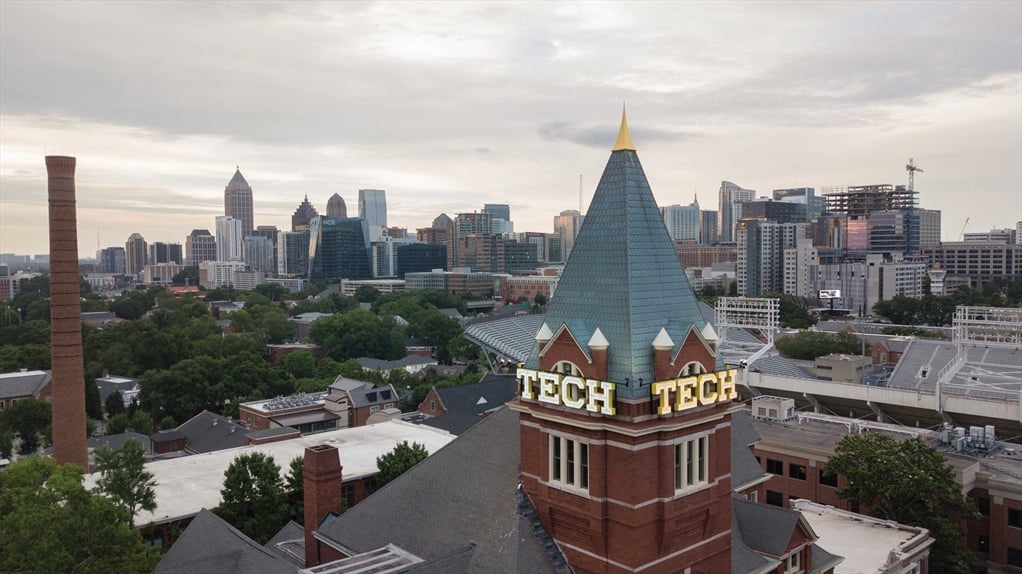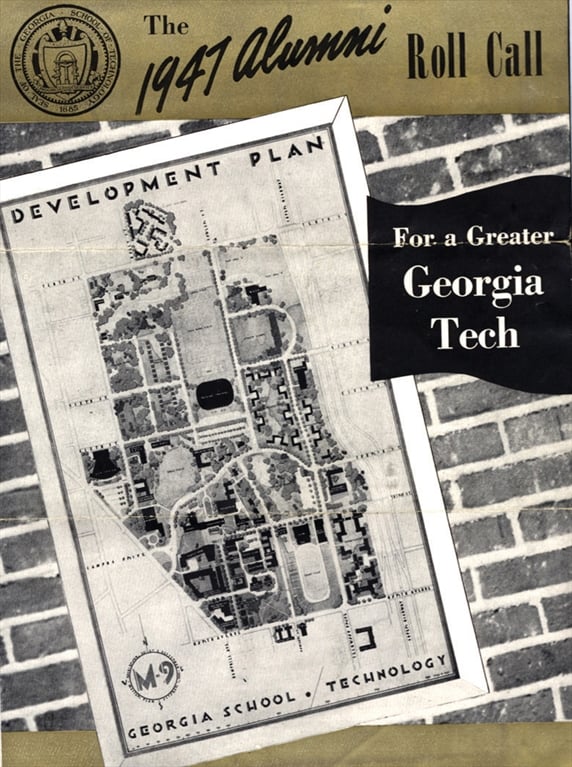Present and Accounted For
By: Tony Rehagen | Categories: Traditions, Tech History

AFTER 75 YEARS, THE COLLECTIVE POWER OF CONTRIBUTIONS TO ROLL CALL, TECH'S FUND FOR EXCELLENCE, IS STILL MAKING A HUGE DIFFERENCE. READ ABOUT HOW ONE OF TECH'S PROUDEST TRADITIONS GOT ROLLING.
Early in 2021, Malik Rivera, MS QCF 19, was still settling into his new Oakland apartment when his phone rang. On the other end of the line was a Georgia Tech student asking him if he’d be interested in donating to Roll Call, the Institute’s 75-year-old Fund for Excellence.
Rivera had fielded similar requests for money from another college where he’d spent his entire undergraduate career, and he had been unmoved. Besides, he wasn’t at Tech that long, merely a year, using his last bit of NCAA eligibility to play football while getting his master’s degree. Plus, Rivera had only just graduated in 2019, and he was still new at his job in structured finance—he didn’t have a fortune to give.
But Rivera felt he owed Georgia Tech. In less than 12 months in Atlanta, not only had he found success on the football field and in the classroom, but he had made friendships and connections that were already impacting his life. Through one of the school’s career fairs, he had landed an internship with Bank of America that jump started his career. And the CEO of his current San Francisco–based employer was a Tech alum who had first contacted him after a football game. Remembering all of this, Rivera didn’t hesitate to pledge a modest annual gift to Roll Call. “If I hadn’t gone to Georgia Tech, I wouldn’t have the career I have now,” says Rivera. “It has led directly to where I am right now.”
By giving to Roll Call, Rivera has become part of a Tech tradition that goes back almost as far as the Ramblin’ Wreck. In 1947, in the wake of World War II, the Institute faced a dire lack of funding. With little extra money coming from the federal or state government, the Georgia Tech Alumni Association and the Georgia Tech Foundation turned to the students and graduates. The Alumni Association decided to drop its dues requirement and instead ask everyone to give $5.00 plus an additional dollar for each year that had passed since they graduated. The campaign was dubbed “Roll Call” because it was calling for alumni to be “present” in support of their alma mater. “Georgia Tech students and alumni have always been problem solvers,” says Kim Bowden, vice president of Annual Giving and Roll Call. “When the school said, ‘Hey, we have a need,’ people raised their hands and said, ‘We can solve this.’ ”
From its inception 75 years ago, Roll Call has been different than many other fundraising efforts in that any donation of any denomination is welcome and that giving is unrestricted: The money goes into a general pool to be used for whatever needs are most pressing at the time. The idea was that even recent graduates just entering the workforce could give whatever they could afford and still increase the value of their degrees, invest in the Institute and its current student body, and perhaps most importantly, maintain their connection to Georgia Tech.
“In the beginning, I gave a pittance,” says Lamar J. Perlis, IE 49, who started giving to Roll Call in 1948 and is now a Leadership Circle member. “The way I looked at it, it was my duty. I just felt that I had come away with valuable training. I was in band and glee club.

The experiences I had there shaped me. It was home. I knew they needed it. And I would do what little I could to sustain it and help it grow.”
Roll Call donors like Perlis kept giving and watched their alma mater grow into the world-renowned institution that it has become. And they can take pride in saying they’ve been a part of it all. “At 97, I can’t give what I once did,” says Perlis. “But as long as I’m alive, my wife and I will give what we can.” He has given to Roll Call for 74 consecutive years.
While Georgia Tech has grown considerably since the 1940s, the need for Roll Call has not lessened. While corporations and wealthy benefactors have stepped up to build new buildings and programs on campus, the need for unrestricted support from alumni and friends remains.
Roll Call gives the administrators flexibility and nimbleness in addressing sudden challenges, like providing a one-time grant for a student whose internship fell through and needs housing, or travel expenses for another student’s educational opportunity overseas.
March 2020 was a perfect example of Roll Call’s continued value and agility. No one could have foreseen the impact Covid-19 would have with the pandemic landing in the middle of a semester. Suddenly, hundreds of students had unexpected expenses and housing needs. With each request quickly vetted by the Office of Student Life, Roll Call was once again able to be present and impactful. “That’s the power of unrestricted support,” says Bowden. “It gives leadership the ability to react to unforeseen circumstances and capitalize on opportunities. Instead of giving to meet one specific need, donors are essentially saying ‘I trust the Institute.’ And as a result, we can quickly address what students need most at any given moment.”
Roll Call is also unique in that, because it relies on the collective impact of gifts of all sizes, it’s driven as much by recent graduates chipping in as alumni who are more established in their careers. Bowden says that most of the annual individual gifts to Roll Call are less than $1,000, with some as low as $25. Even so, last year alone, those gifts added up to $7 million in the Roll Call coffers.
Rivera is proud to be among those donors. Although he says his career is going well, he’s still not sure he’ll ever be able to put his name on a Tech building. But while he’s working to get there, Roll Call gives him the chance to give back and make an impact. It gives him a link to the Institute that changed his life. “I feel like my donation will do something good—just doing anything is worth something,” says Rivera. “Georgia Tech does so much, it makes me feel better to do what I can to help whomever. I hope that it helps someone get the same experience out of Tech that I did.”


